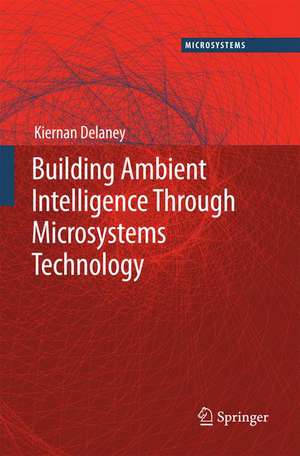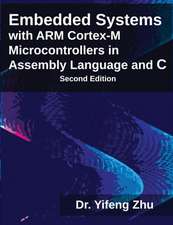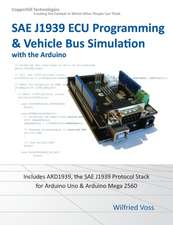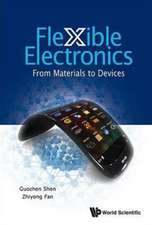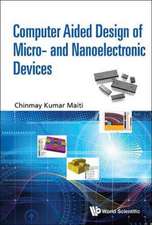Ambient Intelligence with Microsystems: Augmented Materials and Smart Objects: Microsystems, cartea 18
Editat de Kieran Delaneyen Limba Engleză Hardback – 23 oct 2008
Also discussed are current requirements for realizing applications-oriented examples of smart objects (e.g. smart textiles, gadgets, integration of smart systems for utility and environmental monitoring, etc); these are based upon heterogeneous systems linking networks of sensors attached to (or physically embedded in) objects with information management systems enabling collections of smart objects to collaborate to provide proactive services to the user.
Finally, Augmented Materials and Smart Objects describes and discusses a number of vision statements strongly relevant to the future development of distributed embedded sensor and actuator platforms for smart objects, and ultimately Ambient Intelligence. The framework for this is the concept of Augmented Materials; these are materials with fully embedded distributed information systems, designed to measure all relevant physical properties and provide a full knowledge representation of the material; in effect, the material would "know" itself, and its current status.
| Toate formatele și edițiile | Preț | Express |
|---|---|---|
| Paperback (1) | 993.93 lei 6-8 săpt. | |
| Springer Us – 23 noi 2010 | 993.93 lei 6-8 săpt. | |
| Hardback (1) | 1000.38 lei 6-8 săpt. | |
| Springer Us – 23 oct 2008 | 1000.38 lei 6-8 săpt. |
Din seria Microsystems
- 18%
 Preț: 941.05 lei
Preț: 941.05 lei - 15%
 Preț: 640.55 lei
Preț: 640.55 lei - 5%
 Preț: 1105.04 lei
Preț: 1105.04 lei - 15%
 Preț: 643.34 lei
Preț: 643.34 lei - 15%
 Preț: 639.73 lei
Preț: 639.73 lei - 18%
 Preț: 952.72 lei
Preț: 952.72 lei - 18%
 Preț: 950.03 lei
Preț: 950.03 lei - 18%
 Preț: 951.29 lei
Preț: 951.29 lei - 5%
 Preț: 1111.09 lei
Preț: 1111.09 lei -
 Preț: 430.69 lei
Preț: 430.69 lei - 15%
 Preț: 640.06 lei
Preț: 640.06 lei - 18%
 Preț: 952.72 lei
Preț: 952.72 lei - 15%
 Preț: 638.76 lei
Preț: 638.76 lei - 15%
 Preț: 640.71 lei
Preț: 640.71 lei - 15%
 Preț: 638.57 lei
Preț: 638.57 lei - 15%
 Preț: 640.37 lei
Preț: 640.37 lei - 15%
 Preț: 638.43 lei
Preț: 638.43 lei - 15%
 Preț: 643.34 lei
Preț: 643.34 lei - 18%
 Preț: 954.77 lei
Preț: 954.77 lei
Preț: 1000.38 lei
Preț vechi: 1250.47 lei
-20% Nou
Puncte Express: 1501
Preț estimativ în valută:
191.48€ • 208.06$ • 160.95£
191.48€ • 208.06$ • 160.95£
Carte tipărită la comandă
Livrare economică 21 aprilie-05 mai
Preluare comenzi: 021 569.72.76
Specificații
ISBN-13: 9780387462639
ISBN-10: 0387462635
Pagini: 421
Ilustrații: XIV, 422 p.
Dimensiuni: 155 x 235 x 24 mm
Greutate: 0.79 kg
Ediția:2008
Editura: Springer Us
Colecția Springer
Seria Microsystems
Locul publicării:New York, NY, United States
ISBN-10: 0387462635
Pagini: 421
Ilustrații: XIV, 422 p.
Dimensiuni: 155 x 235 x 24 mm
Greutate: 0.79 kg
Ediția:2008
Editura: Springer Us
Colecția Springer
Seria Microsystems
Locul publicării:New York, NY, United States
Public țintă
ResearchCuprins
The Concepts.- An Overview of Pervasive Computing Systems.- Augmenting Materials to Build Cooperating Objects.- Device Technologies.- Overview of Component Level Devices.- Silicon Technologies for Microsystems, Microsensors and Nanoscale Devices.- Hardware Sub-Systems Technologies.- Distributed, Embedded Sensor and Actuator Platforms.- Embedded Microelectronic Subsystems.- Networking Technologies.- Embedded Wireless Networking: Principles, Protocols, and Standards.- Systems Technologies.- Context in Pervasive Environments.- Achieving Co-Operation and Developing Smart Behavior in Collections of Context-Aware Artifacts.- System-Level Challenges.- Power Management, Energy Conversion and Energy Scavenging for Smart Systems.- Challenges for Hardware Reliability in Networked Embedded Systems.- System Co-Design.- Co-Design: From Electronic Substrates to Smart Objects.- Co-Design for Context Awareness in Pervasive Systems.- User-Centered Systems.- User-Centred Design and Development of Future Smart Systems: Opportunities and Challenges.- Embedded Systems Research and Innovation Programmes for Industry.- Applied Systems.- Sensor Architectures for Interactive Environments.- Building Networkable Smart and Cooperating Objects.- Dedicated Networking Solutions for a Container Tracking System.
Textul de pe ultima copertă
Ambient Intelligence with Microsystems: Augmented Materials and Smart Objects
This text investigates relationships that Ambient Intelligence has with current and emerging Microsystems
Ambient Intelligence conceptualizes systems that are proactive, context-aware and unobtrusive. Microsystems enable these systems to be seamlessly integrated into everyday objects.
This work examines the opportunities and challenges in using integrated computing with MEMs sensors. It evaluates the impact of trends towards embedded sub-systems, including System-in-a-Package solutions, as well as rapidly growing areas of research, such as wireless sensor networks.
Methods for realizing smart objects are discussed, including smart textiles, intelligent surfaces, smart tracking and environmental monitoring systems, This provides for an infrastructure of heterogeneous systems attached to (or physically embedded in) everyday objects that enable collections of smart objects to collaborate and provide services.
Technical barriers are discussed as well as methods to meet the challenges of what is a strongly collaborative process. Co-design is integral to this; for optimal results the goal must be co-innovation, with the needs of key stakeholders recognised and addressed.
Ambient Intelligence with Microsystems: Augmented Materials and Smart Objects discusses the vision statements relevant to future embedded sensor platforms for smart objects and, ultimately, Ambient Intelligence.
Readers will find up to-date research in Ambient Intelligence and in Microsystems including;
This text investigates relationships that Ambient Intelligence has with current and emerging Microsystems
Ambient Intelligence conceptualizes systems that are proactive, context-aware and unobtrusive. Microsystems enable these systems to be seamlessly integrated into everyday objects.
This work examines the opportunities and challenges in using integrated computing with MEMs sensors. It evaluates the impact of trends towards embedded sub-systems, including System-in-a-Package solutions, as well as rapidly growing areas of research, such as wireless sensor networks.
Methods for realizing smart objects are discussed, including smart textiles, intelligent surfaces, smart tracking and environmental monitoring systems, This provides for an infrastructure of heterogeneous systems attached to (or physically embedded in) everyday objects that enable collections of smart objects to collaborate and provide services.
Technical barriers are discussed as well as methods to meet the challenges of what is a strongly collaborative process. Co-design is integral to this; for optimal results the goal must be co-innovation, with the needs of key stakeholders recognised and addressed.
Ambient Intelligence with Microsystems: Augmented Materials and Smart Objects discusses the vision statements relevant to future embedded sensor platforms for smart objects and, ultimately, Ambient Intelligence.
Readers will find up to-date research in Ambient Intelligence and in Microsystems including;
- A practical approach to realizing concepts within Ambient Intelligence, including new heterogeneous systems infrastructures and international R&D programs
- Analyses of embedded microelectronic sub-systems and novel assembly techniques for autonomous MEMs sensors.
- Reviews of initiatives in collaborative research that are leading to innovation in hardware, networking and software, including the effect of whole-systems methodologies
Caracteristici
Bridges the gap between microsystems research and the new challenges presented by concepts such as Ambient Intelligence, the Disappearing Computer, and Cooperating Objects Provides a practical approach to the realization of ambient intelligence concepts and discusses the road mapping and scenario development initiatives Investigates the specific implications for the emerging microsystems technologies that will need to be integrated into internet-like heterogeneous systems Analyses the impact of the trend towards embedded microelectronic sub-systems and novel assembly techniques for autonomous MEMs sensors Discusses current requirements for realizing applications-oriented examples of smart objects Reviews new approaches and initiatives in collaborative research that are leading to innovation in both the hardware and software domains. Provides a practical (i.e. based upon demonstrable platforms, prototypes and field trial systems) perspective in reviewing and discussing what has been achieved to date
